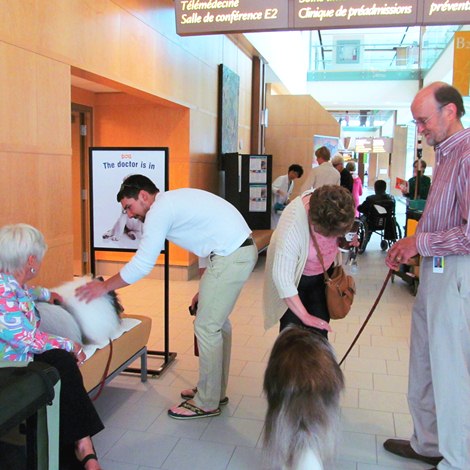
Therapy dogs Diva and Vega demonstrate their stress relieving powers during the 2nd Annual Seniors’ Education Day at the North Bay Regional Health Centre on Wednesday. The day included educational sessions and resource booths on programs available for seniors and caregivers in hospital and in the community.
Navigating the healthcare system can be a task for most people, but for seniors it can be downright overwhelming and frightening.
Understanding that seniors are easily overwhelmed, but at the same time knowing that when armed with the right information the elderly can master everything, the North Bay Regional Health Centre set out to educate seniors and their caregivers about the services available transitioning from hospital to home.
“The focus for our ‘Seniors Friendly Day’ is to celebrate Seniors Month and as an institution to let patients know what services we offer here at the hospital, to support them in understanding what's available to them in the community,” explains Director of Complex Care and Senior’s Mental Health Marian Hibbard.
“To hopefully make any admission to hospital not be as traumatic because they will understand some of the things to expect.”
Hibbard says staying in hospital for long periods of time is not the facilities focus so it is important for patients to understand community resources and how to utilize them in their recovery.
“Recognizing that discharge starts as soon as you enter the door and that were working towards having you get home as soon as you can safely and in a supportive way,” she states.
“Statistics show us that as seniors are admitted to hospital their functional decline occurs fairly quickly and we need to keep them mobilized.”
Retired school principal John Cullis says the symposium was an excellent learning tool for him and his wife.
He says they have had experience time and again with various illnesses, but healthcare model is not what it used to be and it was interesting to see the way it has changed over the years.
“It certainly is much, much better now, much better organized, much more fulfilling,” he tells BayToday.
“Many people still don't realize that things have changed and that there are a lot of groups that they can tap into.”
“If you are distressed or if you have any of those symptoms of the elderly I think they're organized enough now that you just get a hold of any one of the groups and say were new at this we don't understand it tell us all about it.”
Meanwhile, Dr. Grant McKercher says often patients and their caregivers find out about services in a crisis situation and don’t have time to make informed decisions.
He says the aim of educational forums like the on today is to reduce unnecessary stress for everyone involved.
“People have difficulty organizing in a hurry,” he says.
“But it extends beyond them it's often your family members who may be in Toronto or across the country somewhere, so it can be a difficult time with people all of a sudden need services. Some crisis happens they’re admitted to hospital things could change very rapidly, so we have a lot of people around to support that and support the needs that are required at that time.”
McKercher says there are a lot of changes happening in the health care system at every level so healthcare workers continue to lobby government to develop community services and long-term-care in order to prevent the hospitals from being clogged up with non-urgent issues.
“So when the time comes the people that need assistance and urgent care it's going to be there.”


